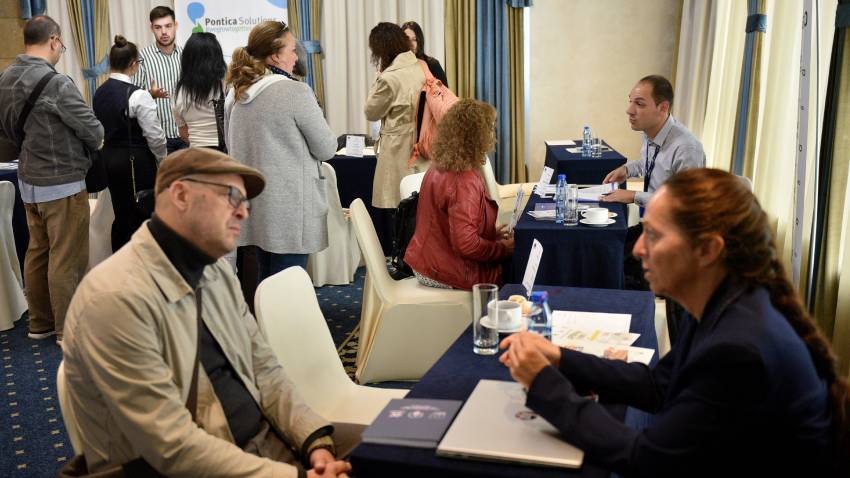Yet Bulgaria remains uncompetitive as regards payment and working environment
Employers in Bulgaria have been experiencing staff shortages for years – of both high and low-skilled workers. According to data of the Bulgarian Employment Confederation, the right people can be found for no more than 30% of the openings on the labour market. The main reason for this, the Confederation says, is that Bulgaria has an ageing population, while the young generation are not ready, or do not want to enter the labour market. 
There is also significant migration of Bulgaria’s working-age population towards the wealthier countries of Europe, attracted by better working conditions and higher pay. The imbalance between labour demand and supply has settled permanently in Bulgaria, experts say. The only way, albeit insufficiently utilized, to pump workers into the Bulgarian economy, is to attract workers from other countries. More than 23,000 people coming from non-EU countries received work permits in Bulgaria in 2023 alone. Every year, one of the biggest trade unions in Bulgaria – the Confederation of Independent Trade Unions in Bulgaria, CITUB, collects data and conducts a survey on labour migration and its role in the country’s labour market. According to the CITUB’s report, the new hires come from many different nationalities.
“A lot of people from countries which are not far from Bulgaria like Ukraine, Uzbekistan, Kirgizstan, Turkey received work permits in this country last year. But companies have been hiring people coming from more distant countries as well – like Brazil, the US, Nepal, Taiwan etc.,” Atanaska Todorova, trade union expert in the labour market, labour migration and mobility sector says in an interview with Radio Bulgaria.  Construction comes first, followed by the category of workers employed in industry – the processing industry, clothing. The number of foreign citizens employed in Bulgaria on a long-term basis has gone up by 66% in the space of one year, says Atanaska Todorova:
Construction comes first, followed by the category of workers employed in industry – the processing industry, clothing. The number of foreign citizens employed in Bulgaria on a long-term basis has gone up by 66% in the space of one year, says Atanaska Todorova:
“During the past year, almost 40% of the people who have received a residence and work permit, left Bulgaria in the first 6 months to go to other European counties. The problem with the labour shortage and providing workers from non-EU countries is connected with the fact that employers are unable to retain the incoming workers. Employers should think very carefully about what they can offer, especially in the category of short-term workers, because that is the category where payment is unattractive. The same holds true of the Bulgarian workers as well. In tourism, for example, they are hired for pay that is close to the minimum salary. In construction, salaries may be higher, but the working conditions there are far from satisfactory. So, even though a great many work permits have been issued to foreigners in 2023, the big challenge remains the pay, or how employers can retain these workers. And one of the reasons economic migrants leave their own country is to be able to support their families back home. Much like the Bulgarians working abroad – they want to be able to send money back to Bulgaria,” says Atanaska Todorova.
Translated and posted by Milena Daynova
Photos: freepik.com, BTA, archive
A Christmas tree with Bulgarian decorations has been placed in a central location at the Griffin Museum of Science and Industry in Chicago. For the fifth consecutive year, Bulgarians living in Chicago crafted the lavish decoration of the Bulgarian..
The usurpation of cultural heritage is one of the many inevitable consequences of any military conflict, both historically and today. Until the end of the war in Ukraine, it is impossible to adequately analyse the extent of the damage caused to the..
Athens plans to modernise the Greek army by 2030 Greece's Defence Minister Nikos Dendias presented the plan for changes in the army to the parties in parliament. The reforms will cover all three branches of the military. By 2030, 33 units..
The traditional Bulgarian Christmas picnic, organized by the Bulgarian Cultural and Social Association "Rodina - Sydney" and the Bulgarian School..
Two graduates of the Bulgarian School "Saints Cyril and Methodius" in Jordan presented their achievements at an event at their school "Hadi al Muhammadi"..
Radmila Sekerinska from North Macedonia appointed NATO Deputy Secretary General NATO Secretary General Mark Rutte has appointed Radmila Sekerinska..

+359 2 9336 661
